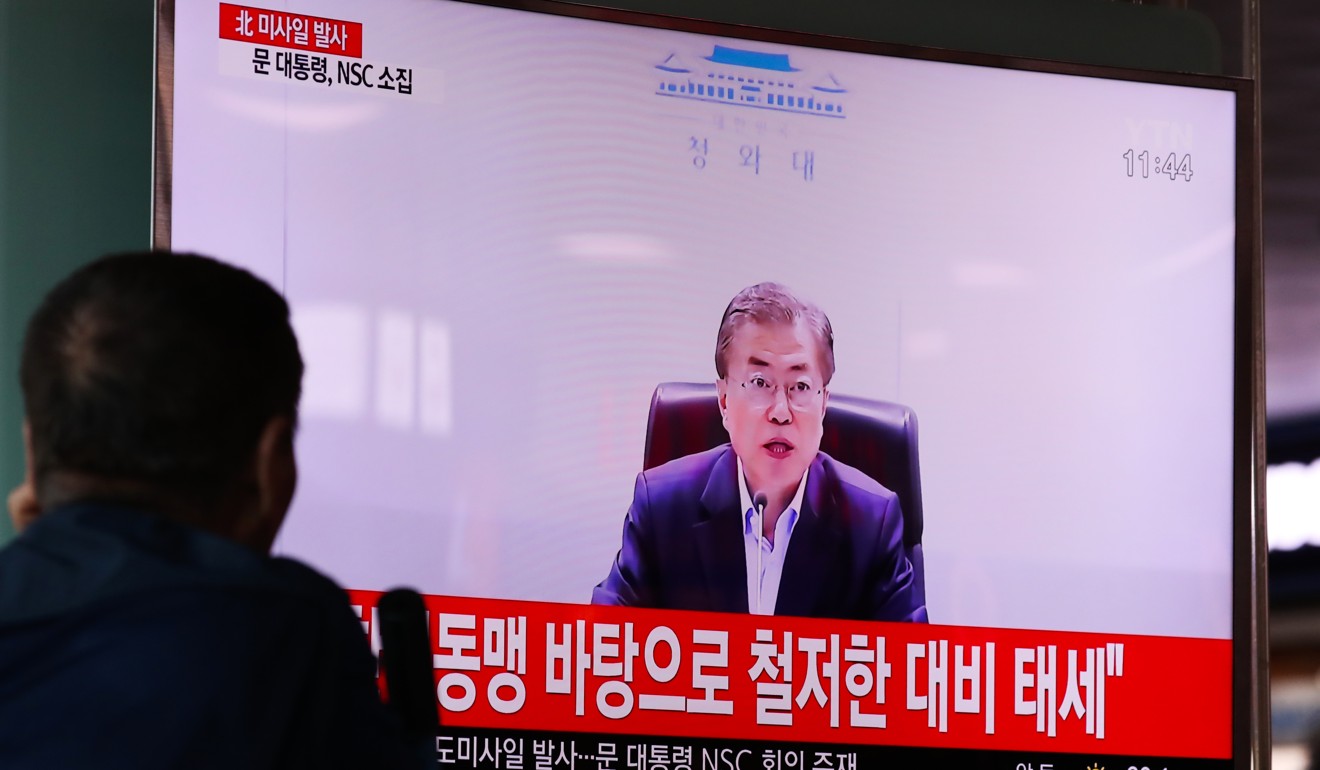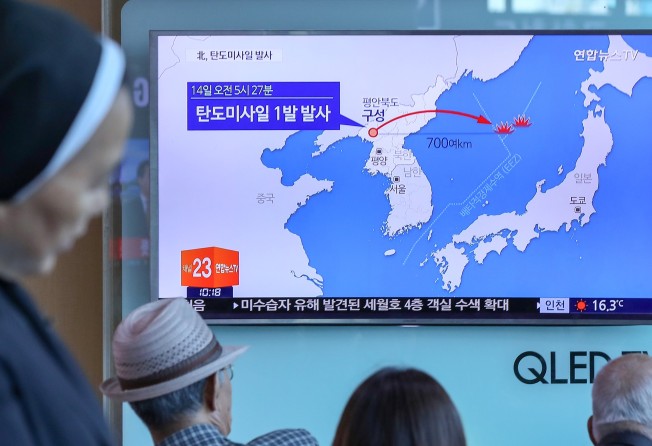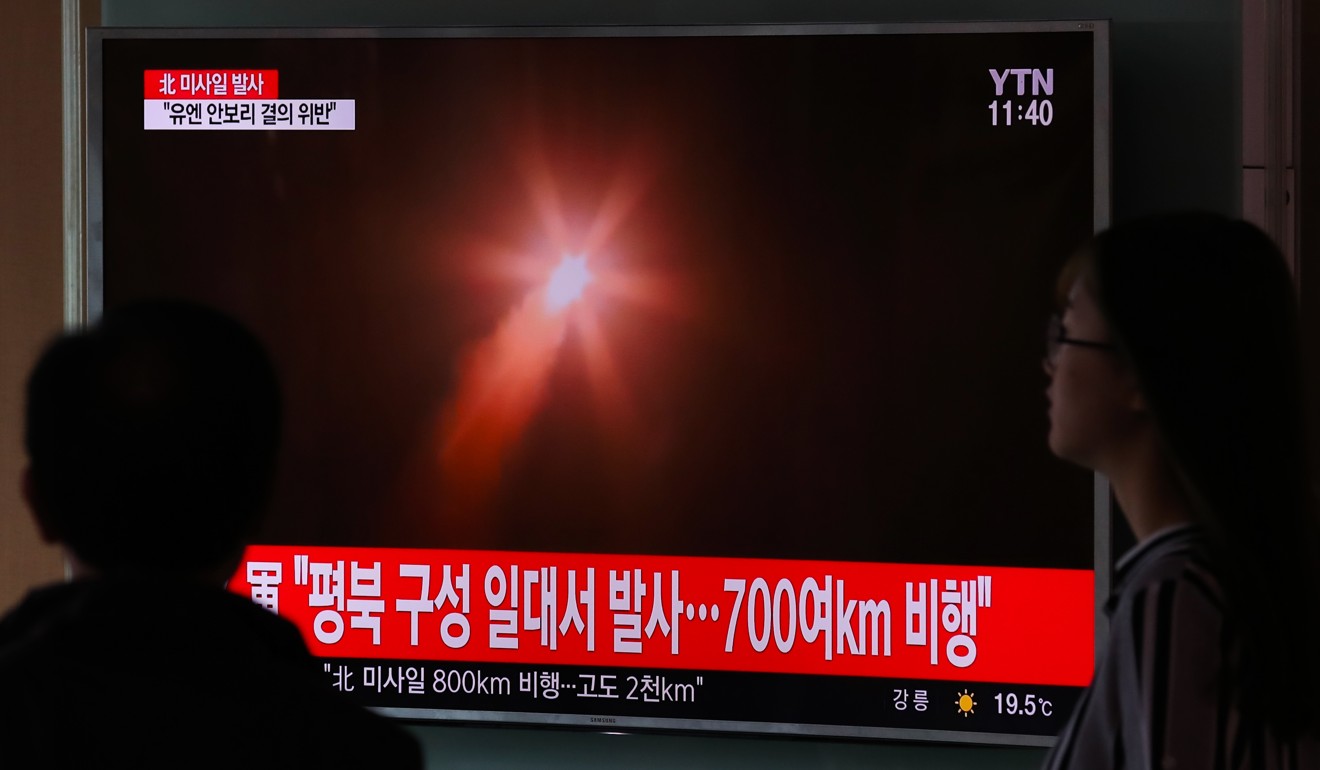
North Korea ‘seizes moment’ to test missile
Launch on day of China’s ‘belt and road’ summit reflects Pyongyang’s determination to push ahead with its nuclear ambitions, analysts say

North Korea tested a ballistic missile early on Sunday, casting a shadow over China’s biggest diplomatic event of the year and disrupting momentum towards a resumption of talks over its weapons programme.
Observers said the launch showed Pyongyang was trying to buy more time to further develop its missile technology and strengthen its hand before any negotiations.
The missile was launched at 5.27am Seoul time and flew for about 30 minutes, reaching an altitude of more than 2,000km before landing in the Sea of Japan.

The test came just hours before China kicked off its Belt and Road Forum for International Cooperation, where Chinese President Xi Jinping is laying out his vision of globalisation to leaders and delegations from dozens of countries. In meeting Russian counterpart Vladimir Putin on the sidelines of the summit, Xi said China and Russia were committed to a political solution to the North Korean nuclear issue.
The foreign ministry said China opposed the test and called on all parties to exercise restraint and avoid worsening regional tensions.
The US government weighed in hours after the missile test, with a reiteration of its support for allies in the region, specifically South Korea and Japan. The statement also urged Russia to take notice.
“South Korea and Japan have been watching this situation closely with us. The United States maintains our ironclad commitment to stand with our allies in the face of the serious threat posed by North Korea,” according to the White House statement. “With the missile impacting so close to Russian soil – in fact, closer to Russia than to Japan – the president cannot imagine that Russia is pleased.”

Japanese Prime Minister Shinzo Abe called the test “a serious threat to Japan”, while new South Korean President Moon Jae-in – who has held out hope for dialogue with the North – warned talks were possible only if Pyongyang changed its attitude.
The head of the South Korean delegation to the Beijing trade summit, Park Byeong-seung, spoke briefly with Kim Yong-jae, the North’s minister of external economic relations, who was also attending the forum, Yonhap News Agency reported.
Earlier in the week, a delegation from the North met a group of former US officials and academics in Norway, after US President Donald Trump said he was open to meeting the reclusive state’s leader Kim Jong-un “under the right circumstances”.
Before the test, Pyongyang’s chief nuclear negotiator, Choe Son-hui, said the North was ready to hold talks with the US “if the conditions are mature”.
Sun Xingjie, a Korean affairs specialist at Jilin University, said Kim had seized upon a lull in tension on the peninsula to push ahead his weapons programme.
“It is actually perfect timing. Xi Jinping’s top priority these days is hosting the summit, and Donald Trump is occupied with the firing of the FBI chief … nobody has kept an eye on Kim,” Sun said. “If the other countries fail to act in concert, North Korea will probably keep using this tactic, pretending to be talking while carrying out more tests.”
But Pyongyang’s latest provocation was unlikely to ignite a military confrontation, Cai Jian, deputy head of Korean studies at Fudan University, said.
“China has made clear a military solution is not possible,” he said, adding that for now, the North remained far from a real threat to US territory.
“Basically, Pyongyang wants to grab as many chips as possible before sitting down at the negotiating table,” Cai said.
Despite the White House’s call for tougher sanctions against North Korea, China was unlikely to beef up its current measures against Pyongyang as long as it held off from carrying out another nuclear test, which would be its sixth, according to Cai.
“Missile tests are fundamentally different from a nuclear test, and China will only stick to the United Nations resolution,” he said.
Additional reporting by Bloomberg and Agence France-Presse